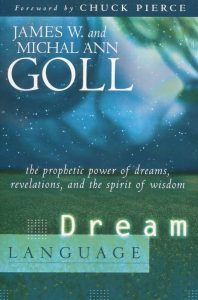Most Christians today are virtually ignorant of the rich heritage of dream language and revelation bequeathed to them by the church throughout its history. Actually, this legacy is older than the church. Christian dream language, like the church itself, has its roots in ancient Judaism. With such a long history, why is this important dimension of Christian experience either unknown or dismissed by so many believers? New Testament Scripture itself says that Jesus Christ is the same yesterday, today and forever. With God, there is “no variation or shadow of turning.” In other words, God never changes. What God did long ago, and throughout history, He does today and will continue always to do. He is eternally the God of now. Dream language is the language of the ages. This is one of the mysterious ways that God intersects our lives. He invades our comfort zones. He visits us in the night and simply speaks to us.  Dreams, visions and interpretations are a part of virtually every culture and religion on earth and have been throughout the ages. This is even truer for Judaism and Christianity than any of the religions as Jews and Christians worship the one true God, who is the author of revelation. To accept dreaming as a legitimate medium for spiritual revelation and communication, then, is to follow the flow of history, especially biblical and church history.
Dreams, visions and interpretations are a part of virtually every culture and religion on earth and have been throughout the ages. This is even truer for Judaism and Christianity than any of the religions as Jews and Christians worship the one true God, who is the author of revelation. To accept dreaming as a legitimate medium for spiritual revelation and communication, then, is to follow the flow of history, especially biblical and church history.
Our Hebraic Inheritance
Jewish Dream Practices
Even today observant Jews take divine dreams and dream language very seriously. They even have a well-established tradition of ritual bedtime prayers designed to prepare the heart and mind for sleep and to be open to God’s visitation through dreams. Many Jews learn these prayers and principles in an abbreviated form early in childhood as they hear their parents recite them each night. “For both adults and children, this bedtime ritual expresses gratitude for the day that has passed and creates a passageway from the waking state into a meaningful dream life.” Certain dream practices can be added to the traditional prayers to enhance one’s spiritual preparation for dreaming. These include the use of a sefer chalomot, or “dream book,” and a time of cheshbon hanefesh, or reflection where one takes a soul inventory. Before we can understand our dreams we must reflect on them and before we can reflect on them must be able to remember them. That is the purpose of the sefer chalomot. Keeping a diary or journal by our bedside can aid us in remembering dreams. It makes it easy for us to record our dreams as soon as we wake up, even if it is the middle of the night. Even a folder or binder of blank loose-leaf paper will do—anything that will provide a comfortable format for recording dreams. Sometimes all it takes to recall your dreams is to make a personal commitment to yourself to remember them. If you are not in the habit of remembering or recording your dreams, be patient. It will probably take a little time to develop this ability.
Three Simple Steps
So here we have three basic principles for handling dream language that have come down to us from Hebrew tradition. First, we expect God to speak. Second, we expect God to enable us to remember what He has given us. Third, we keep a dream book on hand to record our dreams. Isn’t that simple? The second step in Jewish bedtime dream preparation, the cheshbon hanefesh, is a reflective activity where we take the time to review our day and take an inventory of our soul. Reviewing our day just before we go to sleep can help center our thoughts and encourage enlightening, productive dreams. This nightly cheshbon hanefesh is a smaller version of the self-inspection that Jews do on the days between Rosh Hashanah (the New Year) and Yom Kippur (the Day of Atonement). It is during this time that Jews reflect on their life over the past year and review it analytically before moving into a new year.  If you have never tried a regular self-inspection such as this you may be wondering how to go about it. Here are some questions to help you get started. As you begin your personal reflection, consider the following:
If you have never tried a regular self-inspection such as this you may be wondering how to go about it. Here are some questions to help you get started. As you begin your personal reflection, consider the following:
- What happened today?
- Whom did you encounter?
- What were some of the different feelings you experienced?
- What did you feel proud of?
- What do you wish you could improve upon?
- Whom would you like to forgive? Could you give someone who annoyed you the benefit of the doubt?
- Whom would you wish to apologize to for any mistakes you have made? Whom would you like to ask for forgiveness?
- How would you wish God to forgive you?
- Would you like to pray for someone’s health or happiness?
- What are your hopes for tomorrow?
Questions such as these can help put our minds in a reflective state more conducive to receiving dreams. They also help connect our hearts to the heart of our Father and set our minds to look to the Rock, Jesus Christ, from which we are hewn.
Jewish Bedtime Prayers
The cheshbon hanefesh prepares the heart and mind for the tefilah, the bedtime prayers themselves. These actually constitute one prayer in three parts. The first part is the Ha’mapil(‘The One who casts’) prayer, in which we ask God for a night of good dreams and the secure feeling of protection as we sleep:
“Blessed are You, our God, gracious One, Keeper of the World, Who makes my eyes sleepy and causes my eyelids to close. God of those who came before me, Help me to lie down peacefully and rise up peacefully. While I sleep, may I not be disturbed by troubling ideas, bad dreams, or scary thoughts that come to me in the night. May my sleep bring both rest and insight. Blessed are You, God, for illuminating the whole world in glorious ways.”
Part two of the prayer is the familiar Sh’ma that is known to many, Jews and non-Jews alike. Taken from Deuteronomy 6:4, the Sh’ma is the core statement of Jewish belief and loyalty:
“Here O Israel, the Lord our God, the Lord is One.”
The third and final part of the bedtime prayer is referred to as the Angels’ Prayer, which calls upon God to send God’s angels to protect us in the night and enable us to feel the security of their presence…On your right side is Michael, the angel of love; on your left is Gabriel, the angel of power; before you is Uriel, the angel of light; behind you is Raphael, the angel of healing; and over you is the Shekhinah, God’s immanent presence. This prayer goes as follows:
“In the name of the Lord, God of Israel: Made the angel Michael be at my right side, and at my left side, Gabriel, before me Uriel, behind me Raphael, and above my head, Shekhinah El, God’s presence.”
There is great wisdom—and centuries of experience—behind these prayers, as simple and even childlike as they may seem. But remember, Jesus said, “Whoever does not receive the kingdom of God as a little child will by no means enter it. Childlike faith is God-pleasing faith; the kind of faith that gives us access to His presence. This is part of our heritage; something that has been lost to the body of Christ. It is time for us as followers of Christ to return to our Hebraic roots and expect to receive even in our sleep. Let’s make the shift from the Greek practice of over-emphasizing the mind and return to a heart to heart, spirit to spirit encounter with the living God!
The Power of Dreams
 Dreams are powerful things. They can reach us, touch us and change our lives in a way that no other form of communication can. Don’t despise dreams. Don’t turn your back on them as so many in the church did for so many centuries. Open yourself to the world of dream language and, in the tradition of the Jews, expect God to speak to you through dreams, expect to remember what He says, and expect your life to be changed as you respond to what God says to you.
Dreams are powerful things. They can reach us, touch us and change our lives in a way that no other form of communication can. Don’t despise dreams. Don’t turn your back on them as so many in the church did for so many centuries. Open yourself to the world of dream language and, in the tradition of the Jews, expect God to speak to you through dreams, expect to remember what He says, and expect your life to be changed as you respond to what God says to you.
Like our Jewish forerunners, let’s create a culture where the spirit of revelation not only exists but flourishes. It’s time to take back our spiritual birthright and be sons and daughters who walk an illumined path by the One who is the author of dreams.
May Dreams Be Multiplied to You!
James W. Goll
 Dream Language is co-authored by James and Michal Ann Goll. For more on this subject please see the book and accompanying study guide Exploring the Gift and Nature of Dreams.
Dream Language is co-authored by James and Michal Ann Goll. For more on this subject please see the book and accompanying study guide Exploring the Gift and Nature of Dreams.




